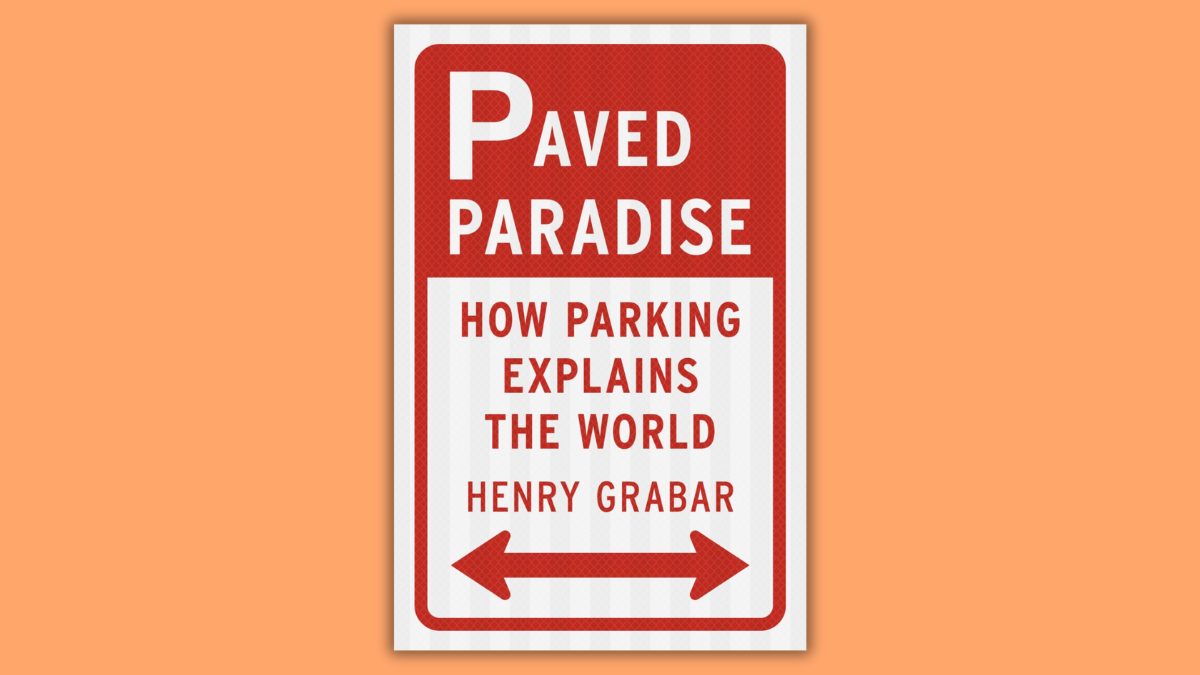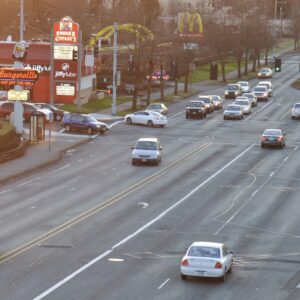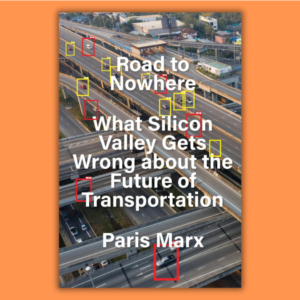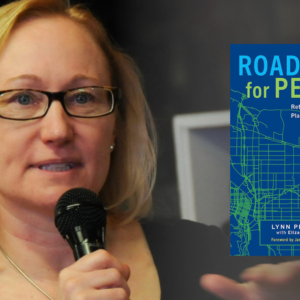Paved Paradise (Penguin, 2023) is a wild ride through the history and politics of parking in America. Author Henry Grabar convincingly shows “How Parking Explains the World,” and he doesn’t even need the whole book to do it.
About mid-way through, he describes the “Forbidden City” tour, which is a tour of old Los Angeles architecture, and the regulations — namely the parking minimums required of new construction — which prevented those forms of beloved neighborhood from continuing to be built. Through these parking minimums “Los Angeles banned itself” and “forced housing to bear the cost of driving.” As Grabar shows, this has played out in cities across the country.
Portland was an early adopter of rolling back parking mandates. In 2002 we dropped minimum parking requirements for buildings within 500 feet of transit—and I remember the ensuing controversy, especially from ticked-off friends who lived near Division. According to Grabar, Portland has gone back and forth with parking policy in the intervening years. At the state level, however, Oregon dropped parking mandates for all development located near transit in 2022. And just this summer, the City of Portland adopted rules which went further and dropped minimum parking mandates citywide.
But even with government on board with loosened parking minimums, financing a building without parking can still be a problem. To get a loan, the developer of Portland’s first building without parking had to fly a credit officer up from Wells Fargo in San Francisco in 2007 to see the number of Portlanders riding bikes and taking the bus. Many area developers continue to build off-street parking even though it is no longer required, but Grabar points out that, nationally at least, developers who do build parking are often downsizing their lots.
Portland is the center of attention of Paved Paradise for about ten pages, with our own parking reformer (and occasional BikePortland commenter) Tony Jordan as the hook. Jordan is one of the founders of the Parking Reform Network, a national organization which “educates the public about the impact of parking policy on climate change, equity, housing, and traffic,” and which has an impressive list of partnering organizations. Economist Donald Shoup is the first of a list of advisors.
Shoup gets a couple chapters in Paved Paradise. A UCLA economist, he published The High Cost of Free Parking in 2005 and started a revolution. (The second of the Shoup chapters is titled The Shoupistas Take City Hall.) Shoup provides the intellectual and academic foundation for an evidence-based over-turning of decades of parking policy, much of it guided by the now-discredited Institute of Transportation Engineers (ITE) Parking Generation Manual and Trip Generation manuals. Shoup showed that these ITE-justified parking requirements “were pseudoscience,” and Grabar does an excellent job of detailing their impact on the nation’s built environment, “… the ITE quantified the experience of sprawl and planners imposed it on small towns, urban neighborhoods, and commercial cores.” A chapter titled Parkitecture describes what resulted:
Parking minimums had not just changed the feel of the street, the density of buildings, the cost of housing, and how much people drove. They had changed American design traditions too … Mostly, Americans just stopped building small buildings. Parking requirements helped trigger an extinction-level event for bite-sized, infill apartment buildings like row houses, brownstones, and triple-deckers; the production of buildings with two to four units fell more than 90 percent between 1971 and 2021.
But Paved Paradise is not just another wonky policy book. It’s entertaining and makes for great summer reading. Who knew parking was so colorful? There’s the mafia, corruption in Chicago, diplomats in New York — and one really tough cookie meter-maid! It’s a page-turner which is hard to put down.
Nevertheless, it was slow reading for me, partly because the book is so thought-provoking. So, yeah, I was reading the book fast enough, but at the same time I was slowed down by a running monologue of questions and ideas specific to Portland.
For example, Portland is in the middle of reviewing our bike-parking requirements because they have been identified by those involved with building as burdensome. Grabar makes it clear that inexpensive and readily available car parking, like freeway-expansion, induces demand for driving and cars. Does the same hold true for bicycle parking and roadway facilities? Research taking advantage of the natural experiment the pandemic provided shows that “if you build it, they will use it,” at least concerning bike lanes.
And what about other “assets?” Grabar does an admirable job of staying tightly-focused on a huge topic—car parking. But as a reader I don’t have to do that. I kept substituting the words “frontage improvements” and “sidewalk” for Grabar’s “parking,” because a lot of developers consider those requirements to be burdensome too. Is it fair for those same developers, or their pro-development allies, to disparage me — or neighborhood associations — for holding the city accountable for following-through on building code-required public improvements?
Affordable housing. This is another huge topic. Local government does make an attempt to protect what it calls “areas vulnerable to displacement,” or gentrification. But what happens when parking minimums are loosened because a project is in the vicinity of public transit, but the transportation money for making that transit safely accessible falls through, like recently happened in Tigard with the Terrace Glenn subsidized apartments? Terrace Glenn even received Transit-Oriented Development (TOD) funds, but the residents won’t be able to safely cross the street in front of their building to reach the transit center a block away.
And then there is the more abstract, chicken-and-egg, Rubic’s cube, question: which comes first, transit or density? Paved Parking addresses that one, and I’ll quote at length, like Grabar did:
You begin to hear radical, Shoupian thinking from the strangest places—like from the Department of City Planning in sprawling Atlanta, where director Time Keane did not mince words. “That has been proven time and time again, in every single city in the world that the more parking you provide, the more people drive,” he told WABE, the local NPR affiliate, in 2016. “We need to shift now, from a situation like this, where you have a heavy parking load associated with an apartment building in a very urban setting, to way less parking, I hear this all the time, ‘Well, we don’t want the density unless we get transit.’ Well, I’ve got news for you. You really have to start with the density and less parking. If you don’t, then you have lost your opportunity, because once you’ve built that infrastructure, it’s so difficult to undo that.
The dynamic behind each of these examples is that of a more agile, profit-motivated, private entity building the housing, and a more cumbersome, vulnerable-to-politics, public entity (with variable and uncertain funding) providing the public goods like transit and street improvements.
These are not easy issues, and I consider “thought-provoking” the highest compliment. If these quandaries interest you, or if you just want a really fun read, pick up Paved Paradise.







Thanks for reading.
BikePortland has served this community with independent community journalism since 2005. We rely on subscriptions from readers like you to survive. Your financial support is vital in keeping this valuable resource alive and well.
Please subscribe today to strengthen and expand our work.
A reader wrote me with some information about Portland’s place, historically, as a national leader in backing off from parking minimums. I didn’t know this. Here’s what the reader wrote:
Strict parking caps make far more sense than simply getting rid of minimums (such an anemic reform). Although to be blunt, from a polycrisis perspective any policy that does not involve wholesale removal of parking spaces in the inner city seems too little and too late.
The amount of parking – in general, but especially downtown – that exists directly next to our most frequent transit lines is disgusting. Transit-oriented parking should be illegal.
Illegalize it!
I agree but I was also thinking about the amount of parking available in the many commercial zones adjacent to higher-income neighborhoods that are well-served by transit (at least by Portland standards).
.
(This would also allow for a higher level of access for disabled people)
PS: OK, maybe I am a left-NIMBY.
I remain shocked that Metro had the gall to build a parking garage next to the Convention Center hotel! That may be the location in town best-served by transit, and they decided a parking garage was the highest and best use for a brand new, standalone building to be built with public money.
I just finished this book a few weeks ago. I really enjoyed it.
I feel obliged to note that the title is presumably nicked from Joni Mitchell’s delightful classic, “Big Yellow Taxi”:
Charlie Hales could be resting on his laurels right now for championing striking down Portland parking minimums as City Commissioner in charge of PBOT in 2000. Instead, when he realized it would lose him votes when he ran for mayor in 2012, he reversed his position, and even pretended he was never actually in favor of it. I was struck then when he was quoted as saying that he never actually thought they would build apartment buildings with no parking because he didn’t think the banks would allow it.
Read all about it: https://www.wweek.com/portland/article-19687-block-busters.html
“No one worked more fiercely than he (Hales) did to push dense development on Portland’s east side, and to pass the no-parking-space requirement (in 2000).”
“Hales’ election-year (2012) turnaround is more striking. He’s become such a convincing ally to these (pro-parking-minimums) activists that many didn’t know he was the one who pushed the original policy 12 years ago.”
“Hales tells WW that when the city was rewriting the zoning code in 2000 to eliminate the parking requirement, he never thought developers would actually build apartments without parking.
“We were trying to get developers to put in one [parking] spot instead of two,” he says. “I certainly wasn’t smart enough to anticipate that banks would finance projects with no parking whatsoever.”
Hales says he wants to halt any new building permits on Division until the city reconsiders the no-parking rule, as well as the details of design review.”
Hales is now a senior vice president at HDR, a large engineering firm that has contracts for the Rose Quarter project, the Burnside Bridge replacement, and I’m sure will get in on the I-5 replacement as well.
A blast from the past. I had read Shoup’s book in 2010 and this happened not long after. We lost this battle, but we won the war. Imagine any of these people defending a comment that we needed more parking than housing built in Portland 10 years ago!!
But look, that situation is arguably directly responsible for the national parking reform movement, so maybe Hales was a tactical genius?
I haven’t read the book, but I have heard Grabar speak about the topic, and I find it frustrating that he repeatedly made the claim that saving money during construction would lower the ultimate rent/sales price.
It’s an urban legend that just will not die.
That’s a different issue from the relationship between the cost of construction to the cost to the renter.
In your example, the solution is trivial; decouple the rental of the parking spot from the unit, which is very common these days. Now the rents are equal.
Watts, have you looked over the preliminary report from BAE Urban Economics? https://www.portland.gov/phb/documents/ih-calibration-study-meeting-7-findings-slide-deck/download
I’m not defending the analysis, but it talks about “feasibility,” whether the developer would make enough profit to bother with doing the project. How much rent can be charged is a factor. My understanding from their data is that there is a relation between the cost of construction (and many other costs which are broken out) and the median income of the city, and how much they can charge for rent, and yes, the neighborhood. I’m not saying all that is fair or good or just, but it appears to be the way they talk about whether buildings get built.
The feasibility issue has some merit, but it’s at best a second-order effect, and quantifying it would require a huge amount of speculation.
And the City of Portland is paying the consulting group BAE Urban Economics to do those calculations and write a report which will inform the city’s decision on the type and amount of bike parking built into new buildings, as well as a slew of other current building code mandates. That is what is going on now.
It’s kind of sad that YUCRPIMBYs* are so detached from the lived experience of renters that they can’t understand that most avoid paying for parking by simply not paying for parking. And I say this as someone who supports elimination of parking minimums but also does not believe this is some sort of magic solution to our city’s chronic low-income housing crisis.
*Yes to upper-class and rich people in my back yard.
Of course. Housing that includes a dog wash station is more expensive than housing that does not.
That’s not what he was saying, and that’s not what I was commenting about.
I guess the law of supply and demand no longer works for parking spaces. You might have a point for new developments where the developer has to make their margin or risk jingle mail. However, for existing buildings, it’s less obvious that parking spaces have much intrinsic value when renters can easily park for free.
The City of Portland forces developers to build all sorts of dumb things for which there is little demand, such as, parking spaces and ground floor commercial space. How about instead of the expensive and twee mixed-used-commercial properties(f*ck the YIMBY sidewalk ballet) we legalize building boring no-frills multi-story apartment buildings everywhere.
Watts, have you looked over the preliminary report from BAE Urban Economics? https://www.portland.gov/phb/documents/ih-calibration-study-meeting-7-findings-slide-deck/download
I’m not defending the analysis, but it talks about “feasibility,” whether the developer would make enough profit to bother with doing the project. How much rent can be charged is a factor. My understanding from their data is that there is a relation between the cost of construction (and many other costs which are broken out) and the median income of the city, and how much they can charge for rent, and yes, the neighborhood. I’m not saying all that is fair or good or just, but it appears to be the way they talk about whether buildings get built.
Watts, I emailed them to you over the weekend, to your gmail. I can’t repost them without them appearing under my name. But if you want to rebuild the exchange, go ahead and repost and I will respond.
The feasibility issue has some merit, but it’s at best a second-order effect, and quantifying it would require a huge amount of speculation.
You are correct, the effect is indirect. But one can see that if too many developments don’t “pencil out,” it might constrain supply and drive up rental prices of the existing rental stock.
The City of Portland is paying the consulting group BAE Urban Economics to study those inputs and write a report which will inform the city’s decision on the type and amount of bike parking built into new buildings, as well as a slew of other current building code mandates. That is what is going on now, and decisions will be made in an environment with an enormous amount of uncertainty. That’s why I’m keeping a close eye on the proceedings.
I agree, but collecting evidence that this is happening seems nearly impossible, not least because much of the source data (which projects were considered, then dropped, and why) comes from a highly motivated and unreliable narrator (i.e. developers themselves, who have every interest in convincing cities to do things that make future development more profitable), and the effects are very diffuse.
If the public want our cities to perform a certain way (i.e. we want to maintain tree cover or ensure people have a place to park their bikes), then at a minimum we need to ensure future development helps meet those goals. Developers have a habit of crying “poor me” all the way to the bank.
I’ve been reading Grabar for years on Slate. Recently he had more to say about who really needs MORE parking (trucks).
Thank you Fred, that was a good article.
Perhaps residents of these structures built without off street parking should receive “free” public transit passes for each person. The cost could be included in the rent, or condo fees. This could help encourage residents to not own cars that take up all of the on street parking in a neighborhood. I take great offense when someone who is not visiting my immediate neighbors or me takes the parking spot under the shade trees that I take care of, and leaves their car there for days at a time. This did not happen before the multiplexes were built in my neighborhood. For 25 years I have lived 6 blocks from where the (new to me) Yellow Max Train line was built and on street parking is diminishing quickly.
With the current state of Trimet that almost sounds like you are punishing someone for not having a car. I think I’d take the car over Trimet any day of the week until Trimet can do a 180 and improve the safety and reliability of their service.
Well at least it appears that TRIMET finally realizes that “de-emphasizing” law enforcement on the Max and buses was a bad idea (see article link below) It is very concerning that the local transportation “advocates” and nonprofits aren’t also calling for more police presence on public transit. They are still operating on the very 2020 approach that Portland would be better off with less law enforcement. We all saw how that worked out. Until public transportation is viewed as safe our transit share will not increase. Regular security, police presence and fare enforcement is a requirement for that to happen.
https://www.wweek.com/news/2023/08/23/hoping-to-assuage-rider-fears-trimet-amps-up-policing-at-certain-transit-stations/
This book is definitely on my list. I think that off-street parking, and the discourse it spawns when it comes to changing the status quo, is so fascinating.
There seems to be this black-and-white view that if you live somewhere with scarce parking you can’t own a car. I feel like taking away off-street parking can still influence the behavior of “I’m never giving up my car” people. When buying new cars, they are incentivized to buy a smaller car that is easier to park. I own a Honda Fit and when I do choose to drive, never have trouble parking because it’s so small. Households might also go for one car and a cargo bike instead of 2 or 3 cars if parking is constrained. Cars are bad but smaller cars are less bad.
You might also end up parking further away, which makes biking and transit more attractive options. I park 5-6 blocks away on the street but the bus stop is right across the street and the bike room is just downstairs. Even for folks who won’t or can’t stop driving everywhere, that 6 block walk is probably a good thing – they’re at least interfacing with their neighborhood on foot, rather than just through a windshield. Street parking directly adjacent to apartment entrances and spots in garages should be reserved for handicap-only IMO. Some people legitimately can’t walk 6 blocks and we should be planning for that.
I guess what I’m getting at is that we should be framing these policy issues as reducing driving rather than reducing car ownership. Most folks are not opposed to replacing car trips if the alternatives are more convenient than driving, but still prefer the security blanket of car ownership. I think most folks are on board with driving less, but not giving up their cars entirely.
The Institute of Transportation Engineers (ITE) Parking Generation Manual and Trip Generation manuals may now be discredited among the few who care, but aren’t they still in widespread use? My understanding is that all but the most progressive jurisdictions still use it, some of them referring to them in code or statute. Is that not the case?
Lisa,
Bless your heart for reading this book. I just don’t think I could get myself to pick up a book on parking.
If this book had been available a few years ago, I might have snapped it up. I’d just built some new bookshelves, and had lots of space for new books. I’d buy any new book that looked interesting.
Then when my shelves started filling up, I got more selective, and just bought books I was certain I’d like.
Then I finally filled up the shelves. I still buy books, but I leave them around the house, out on tables and wherever I can fit them, which is really a pain sometimes. I also have switched over to alternatives such as reading things online. I’ve thought of building some more shelves but that would mean taking space away that I need for other things.
I say I MIGHT have snapped it up, because I’m not sure I believe the premise that having lots of parking spaces available makes people more likely to use cars. Sounds dubious.
DLCD has compiled the academic research on car ownership, car use, and parking provisions. Read it here. https://www.oregon.gov/lcd/CL/Documents/ParkingCarsDriving.pdf
Thank you Evan, the compiled research is handy and helpful.
The joke misser has logged on.
I checked out the audiobook from my local library. It was free and didn’t take up any space on my crowded book shelves.
qqq, your post reminds me of something I read in the NYT a few years or decades ago. It was one of those Sunday supplement/column thingeys, an “At home with,” with Jackie O.
The fawning reporter noted the artfully arranged stacks of books all over her apartment, and wrote that s/he had seen a lot of people try to decorate with overflow books but that nobody—nobody!—had ever succeeded at tastefully integrating books as structure into home decor the way Jackie had.